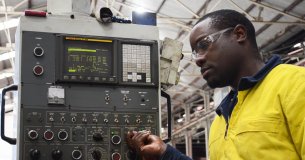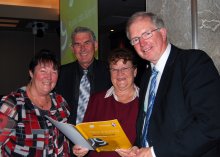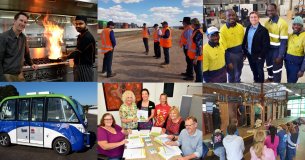-
Featured Items
-
Featured Resources
 Funding & Grants
Don't miss out on funding opportunities. Stay informed with our up to date online listings and email notifications.
Read More
Funding & Grants
Don't miss out on funding opportunities. Stay informed with our up to date online listings and email notifications.
Read More
 Skilled Migration
Our services help both applicants and employers, to learn more, develop plans, submit applications, and settle in.
Read More
Skilled Migration
Our services help both applicants and employers, to learn more, develop plans, submit applications, and settle in.
Read More
 Research and Analysis
Good research and analysis makes the case. How can our resources and services help your project or application?
Read More
Research and Analysis
Good research and analysis makes the case. How can our resources and services help your project or application?
Read More
 Information & Data Resources
With resources like REMPLAN, Regional Knowledge Base, and decades of data, discover how we can help your project.
Read More
Information & Data Resources
With resources like REMPLAN, Regional Knowledge Base, and decades of data, discover how we can help your project.
Read More
-
Stay InformedSubscribe to one or more of our regular email subscriptions, to be kept up to date on news and funding opportunities for the region
-
-
Our Region
- Our Region
- Regional Plan
- Regional Data
- Current Regional Issues
- Population Migration Analysis for 2016-21
- Job Vacancies Continue at All-Time High
- National Debt - What it Means for Our Economy?
- The True Value of Home Solar
- The Economic Impacts of Local Government Amalgamations
- State of the Regions Report 2014-15
- Antifragility - A different take on regional economic development
- Biohubs - Collaborative Waste Management
- Attracting New Residents
- Socio-Economic Impacts of the Murray Darling Basin Plan
- Murray Darling Basin Water Recovery
- Growing Businesses
- The Northern Inland Economy
- Geographical Overview
- Major Industry Sections
- Our Services
- Grants and Funding
-
Skilled Migration
- Skilled Migration
- Skilled Employer Sponsored Regional Visa
- Skilled Work Regional Visa (subclass 491)
- Temporary Seasonal Workers
- Designated Area Migration Agreement (DAMA)
- Helpful Information for Visa Holders
- Information for Employers
- Case Studies
- Payment Details
- Advice & Further Information
- Contact Details
- News & Events
-
Our Projects
- Our Projects
- Current Projects
- Skilled Migration
- Wool Works - Wool Training Schools
- Metal Works - Welding and Fabrication Schools
- Come On Inland
- Stories of Resilience
- Alt Brothers Beekeeping - Glen Innes
- Carelle's Toy Store - Glen Innes
- Greenhill Orchards - Arding
- Gwydir Meats - Warialda
- Kaputar Motors - Narrabri
- Moonbi General Store - Moonbi
- Sandstock - Tingha
- Sherelle Fashions - Tenterfield
- Sleepy Merino - Inverell
- Tenterfield Chamber of Toursim, Industry and Business - Tenterfeild
- The Welders Dog - Armidale
- Walcha Veterinary Supplies - Walcha
- AGCAP - Agribusiness Careers & Professions
- Northern Inland Regional Investment Profile
- Past Projects
- Digital Economy Strategy
- Business Growth Project
- Go Digital
- How to Start an Online Business
- Create Your Website Using Squarespace
- How to Edit Your Squarespace Site - Part 1
- How to Edit Your Squarespace Site Part 2
- Add a Shop to Your Squarespace Site
- Start a Blog and Find out What Customers are Searching
- 14 Tips For a Better Blog Post
- Which Social Media Platforms are Best for Your Business
- How to Use Facebook Effectively For Your Business – Part 1
- How to Use Facebook Effectively For Your Business – Part 2
- Instagram Tips for Business
- Catching Up, More Instagram & Dealing with Haters
- Getting Started with Twitter for Business
- Social Media Scheduling Tools
- How to Start an Etsy Shop – Part 1 – Research
- How to Start an Etsy Shop – Part 2 – Signup
- Online Security for Your Business
- Product Photography and Website Images: Your Guide
- 5 Tips to Improve your Productivity in your Business
- Best Online Business Resources
- How to Improve Your Communication Skills and Win More Clients
- NBN Coordinator
- Putting Power Back in the Regions
- Road Freight Study
- Town Audit Benchmarks
- Food and Wine
- Youth Survey
- Digital TV Switchover Assistance
- Northern Inland Transport Guide
- Live.Train.Work
- Northern Inland Innovation Awards
- Northern Inland Innovation Awards - 2017
- Northern Inland Innovation Awards - 2016
- Northern Inland Innovation Awards - 2015
- Northern Inland Innovation Awards - 2014
- Northern Inland Innovation Awards - 2013
- Northern Inland Innovation Awards - 2012
- Norther Inland Innovation Awards - 2011
- Prime Super Northern Inland Innovation Awards - 2010
- Prime Super Northern Inland Innovation Awards - 2009
- Northern Inland Innovation Awards - 2007
- Northern Lights Project
- NBN Smart Home
- Murray Darling Basin
- Moree Plains Business Workshops
- Namoi Investment Prospectus
- Industrial Land
- Bioenergy and Local Electricity Retailing
- Northern Inland Business Energy Assessment
- Skills for the Future
- Impacts of COVID-19 on Businesses
- Past Projects of NIRDB
- Aboriginal Employment and Enterprise in the Gunnedah Region
- Art as an Industry
- Aviation Survey
- Farm Forestry - Northern Inland Forestry Investment Group
- New England North West Film Strategy
- Northern Inland Excellence in Business Awards
- Food and Wine 2003 - 2008
- Prime Super Northern Inland Innovation Awards 2009
- Regional Business Networking Program
- Regional Leadership Course 2008
- Viticulture Strategy 2002-2003
- About Us
- Contact Us
- Other Resources
- Privacy and Legal
- Search
- News & EventsNews & Events
- NewslettersNewsletters
- National conference told: Food production industries need sexier imageNational conference…
Back to Newsletters

National conference told: Food production industries need sexier image
Tuesday 6th of October 2009

Narrabri Mayor, Robyn Faber; Interim Executive Officer of Regional Development Australia – Northern Inland (comprising the former Northern Inland Regional Development Board), Don Tydd; President of the Country Women’s Association of Australia, Heather Wieland; and CEO of AgriFood Skills Australia, Arthur Blewitt.
A major national Agrifood Skills and Workforce Conference was hosted by AgriFood Skills Australia in Darling Harbour recently. The theme was ‘new thinking’ and it centred on building better rural career pathways. The North West NSW Regional Jobs Summit in July, 2009 was co-sponsored by the then Northern Inland Regional Development Board. Much of the conference highlighted problems in recruiting both skilled and unskilled agricultural employees and the Narrabri summit was acknowledged at the national conference for presenting solutions, ideas, and regional strength through community unity. Agricultural industries have critical labour needs, yet the demands on food production are sky-rocketing, in line with global food shortages.
AgriFood Skills Australia works in collaboration with the AgriFood industries and governments to support the development of quality training products and services, as well as developing and supporting workforce innovation. The AgriFood industry includes all rural and related industries; food processing, including beverages, wine and pharmaceuticals; meat processing; seafood; and racing. “Demand on AgriFood industries is booming, yet they are still taken for granted. We need to affect a great deal of change, in training, employment and regional development. People from a diverse range of organisations, expertise and backgrounds will have to work together for that change to be realised. I think that, through this conference, we showed that it can happen,” CEO of AgriFood Australia, Arthur Blewitt said.
Close to 200 delegates from education and training, industry and government sectors attended the conference. They were told that the world is facing a food production crisis and Australia is in the thick of it. The United Nations, academics and industry have forecast that by the year 2050, the world’s population will be 9 - 9.5 billion people. As a leading player in the global food trade, two-thirds of Australia’s agricultural production is exported, contributing 22 percent of the nation's export earnings. Domestically, Australia’s population is also on the rise and demand on food production is rising exponentially. The widely excepted view is that food production will need to have doubled in the next 40 years, but at present, agriculture productivity in Australia is struggling to maintain momentum, due largely to drought, climate change and reduced rural workers.
“Our need for workers is expected to grow by 50 percent in the next 20 years. We don’t know where they’re coming from but we need to act now,” Mayor of Narrabri Shire and business owner, Robyn Faber said. “The major issues are simply how do you get people, how do keep them, how do you make people want to work for you and how seasonal workers can stay in the community.” One Narrabri concept discussed was a seasonal work calendar on the local council’s website, which shows what seasonal work options exist and when, so multiple local employment options could potentially be co-ordinated.
Another delegate from the New England North West region of NSW was Don Tydd, the Interim Executive Officer of Regional Development Australia – Northern Inland (comprising the former Northern Inland Regional Development Board). “We’ve seen how regional development has to be achieved from the ground up, driven by the community itself. Northern Inland NSW is one of the biggest food and fibre producers in Australia; that fact has been under-appreciated, locally and nationally, for too long,” he said. “Agricultural skills have traditionally been ‘farm grown’. Farm skills in the next 100 years will have to be taken to higher levels and the industry will have to invest more heavily in human resources.”
The conference addressed a number of fundamental issues seen as essential if rural and regional Australia is to meet the need to boost agricultural food production.
Keynote speaker was the Chief Executive Officer of the Australian Food and Grocery Council, Kate Carnell AO. “Food production is so important in Australia yet it has a serious image problem. We need to raise the industry’s profile, make food producing more ‘sexy’,” she said. “Governments can also do more. At State and Federal levels, we do not have a Ministerial port folio representing the interests of agrifood industries, yet there are Ministers responsible for mining.”
Kate Carnell and other speakers put the spotlight on salaries in agriculture. The mining sector is often blamed for attracting more than its share of skilled labour in rural and regional Australia. The General Manager of Policy and Strategy for the NSW Minerals Council, Sue-Ern Tan said the higher salaries in mining strengthen regional economies. “Mining and farming can share pools of labour. A lot of farmers in drought have sought mining work to supplement the farm income. Skilled labour shortages impact on both industries. We need to work together, to build and promote diverse and sustainable regional communities, where the quality of life is appealing,” she said.
A focal concern at the national AgriFood conference was the difficulty that agricultural sectors have in attracting and retaining labour. This included an investigation into Vocational Education and Training (VET), the need for a better image and a coordinated national approach to VET.
Dr. John Buchanan is the Director of the Workplace Research Centre at the University of Sydney and his talk explored workforce development in primary industries, drawing on recent research that included farmer interviews. He said the conference boasted a ‘who’s who’ of people involved in agricultural workforce and training issues throughout Australia. “For them to come together, with a spirit of inquiry and preparedness to break with old ways, where they are not working – it was refreshing to see,” he said.
Dr. Buchanan described the options explored in Narrabri as leading edge within Australia, but conceded that Governments would have to assist talk and ideas become actions and results.
“Rural and regional Australia is going through a major rationalisation. In the 1940’s, one in four Australian’s worked in rural industries. Now, smaller towns are being folded into larger centres,” Dr. Buchanan said.
“We need new arrangements, where farmers co-operate with each other and education institutions to build up the workforce required.” He explained that competency based training for specific skills had proven to be uninspiring whereas vocational training for “a career in farming” for example, would be more attractive.
“We’ve found that family members are no longer a significant proportion of the on-farm workforce. Farm hands represent skilled and demanding roles. As employers, farmers need to ensure they are doing what is right for their workforce. If you can’t afford to pay a decent rate of pay, maybe your business isn’t viable. We’ve seen that reality in the textile, clothing and car industries this year.”
The conference was endorsed by an iconic advocate for rural communities. President of the Country Women’s Association of Australia, Heather Wieland said her concern over the retention of workers in rural areas brought her to the conference. “Infrastructure and equity for country people is paramount. It was great to see so much commitment and productive exchange of ideas for the sake of rural communities,” she said.
Related Pages







 Latest News
Latest News
